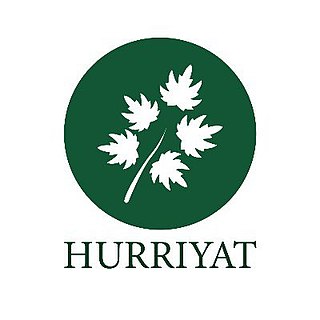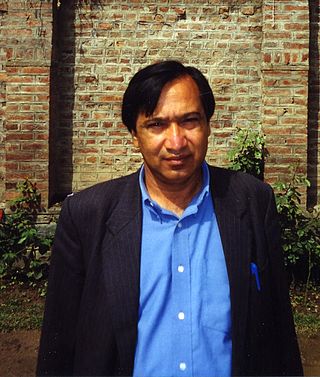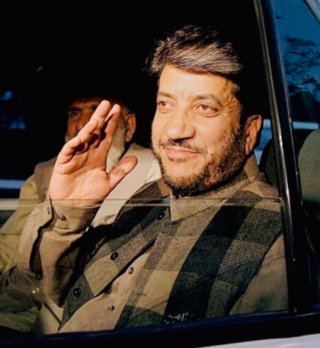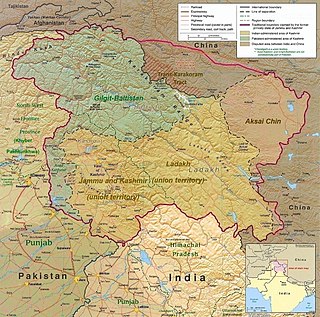
Kashmir is the northernmost geographical region of the Indian subcontinent. Until the mid-19th century, the term "Kashmir" denoted only the Kashmir Valley between the Great Himalayas and the Pir Panjal Range. Today, the term encompasses a larger area that includes the India-administered territories of Jammu and Kashmir and Ladakh, the Pakistan-administered territories of Azad Kashmir and Gilgit-Baltistan, and the Chinese-administered territories of Aksai Chin and the Trans-Karakoram Tract.

Jammu and Kashmir was a region formerly administered by India as a state from 1952 to 2019, constituting the southern and southeastern portion of the larger Kashmir region, which has been the subject of a dispute between India, Pakistan and China since the mid-20th century. The underlying region of this state were parts of the former princely state of Jammu and Kashmir, whose western districts, now known as Azad Kashmir, and northern territories, now known as Gilgit-Baltistan, are administered by Pakistan. The Aksai Chin region in the east, bordering Tibet, has been under Chinese control since 1962.

The Jammu & Kashmir National Conference (JKNC) is a regional political party in the Indian union territories of Jammu and Kashmir and Ladakh. Founded as the All Jammu and Kashmir Muslim Conference by Sheikh Abdullah and Chaudhry Ghulam Abbas in 1932 in the princely state of Jammu and Kashmir, the organisation renamed itself to "National Conference" in 1939 in order to represent all the people of the state. It supported the accession of the princely state to India in 1947. Prior to that, in 1941, a group led by Ghulam Abbas broke off from the National Conference and revived the old Muslim Conference. The revived Muslim Conference supported the accession of the princely state to Pakistan and led the movement for Azad Kashmir.

All Parties Hurriyat Conference (APHC) is an alliance of 26 political, social and religious organizations formed on 9 March 1993, as a united political front to raise the cause of Kashmiri separatism in the Kashmir conflict. Mehmood Ahmed Saghar was the first convener of the APHC-PAK chapter when the alliance was established in 1993. The alliance has historically been viewed positively by Pakistan as it contests the claim of the Indian government over the State of Jammu and Kashmir. The organisation is split into two main factions the Mirwaiz and Geelani, The Mirwaiz Umar Farooq is the founder and chairman of Mirwaiz faction and the Masarat Alam Bhat is the interim chairman of Geelani faction faction he succeeded Syed Ali Shah Geelani after his dead who was the founder and chairman of Geelani faction.

The Kashmir conflict is a territorial conflict over the Kashmir region, primarily between India and Pakistan, and also between China and India in the northeastern portion of the region. The conflict started after the partition of India in 1947 as both India and Pakistan claimed the entirety of the former princely state of Jammu and Kashmir. It is a dispute over the region that escalated into three wars between India and Pakistan and several other armed skirmishes. India controls approximately 55% of the land area of the region that includes Jammu, the Kashmir Valley, most of Ladakh, the Siachen Glacier, and 70% of its population; Pakistan controls approximately 30% of the land area that includes Azad Kashmir and Gilgit-Baltistan; and China controls the remaining 15% of the land area that includes the Aksai Chin region, the mostly uninhabited Trans-Karakoram Tract, and part of the Demchok sector.

Article 370 of the Indian constitution gave special status to Jammu and Kashmir, a region located in the northern part of the Indian subcontinent and part of the larger region of Kashmir which has been the subject of a dispute between India, Pakistan and China since 1947. Jammu and Kashmir was administered by India as a state from 17 November 1952 to 31 October 2019, and Article 370 conferred on it the power to have a separate constitution, a state flag, and autonomy of internal administration.
The following is a timeline of the Kashmir conflict, a territorial conflict between India, Pakistan and, to a lesser degree, China. India and Pakistan have been involved in four wars and several border skirmishes over the issue.
On 26 May 2008, the government of India and the state Government of Jammu and Kashmir reached an agreement to transfer 99 acres (0.40 km2) of forest land to the Shri Amarnathji Shrine Board (SASB) in the main Kashmir valley to set up temporary shelters and facilities for Hindu pilgrims. This caused a controversy, with demonstrations from the Kashmir valley against the land transfer and protests from the Jammu region supporting it. The largest demonstration saw more than 500,000 protesters at a single rally, among the largest in Kashmir's history.

Mohammed Yousuf Tarigami is an Indian politician from Jammu and Kashmir. He is the Convenor and Spokesperson of People’s Alliance for Gupkar Declaration.
The Jammu and Kashmir Legislative Assembly, also known as the Jammu and Kashmir Vidhan Sabha is the legislature of Indian union territory of Jammu and Kashmir.

Shabir Ahmad Shah popularly known as Shabir Shah, in Kadipora, Anantnag, Kashmir is the founder and president of the Jammu and Kashmir Democratic Freedom Party (JKDFP), one of the main separatist political organizations seeking "right of self-determination" to Jammu and Kashmir.
The Kashmiri diaspora refers to Kashmiris who have migrated out of the Kashmir into other areas and countries, and their descendants.

The Exodus of Kashmiri Hindus, or Pandits, is their early-1990 migration, or flight, from the Muslim-majority Kashmir valley in Indian-administered Kashmir following rising violence in an insurgency. Of a total Pandit population of 120,000–140,000 some 90,000–100,000 left the valley or felt compelled to leave by the middle of 1990, by which time about 30–80 of them are said to have been killed by militants.
The Jammu Praja Parishad was a political party active in the Jammu Division of the Indian-administered Jammu and Kashmir. It was founded in November 1947 by the Rashtriya Swayamsevak Sangh activist Balraj Madhok, and served as the main opposition party in the state. It maintained close ties with Bharatiya Jana Sangh during its lifetime and merged with the latter in 1963. Its main activity was to campaign for the close integration of Jammu and Kashmir with India and oppose the special status granted to the state under the Article 370 of the Indian constitution. After its merger with the Bharatiya Jana Sangh, the precursor of the present day Bharatiya Janata Party, the party gradually rose in stature. As an integral part of the Bharatiya Janata Party, it was a partner in the ruling coalition led by the People's Democratic Party.

The following outline is provided as an overview of and topical guide to Jammu and Kashmir:
Under Dogra rule, people in the princely state of Jammu and Kashmir launched several political movements. Despite ideological differences and varying goals they aimed to improve the status of Muslims in a state ruled by a Hindu dynasty.

Jammu and Kashmir is a region administered by India as a union territory and consists of the southern portion of the larger Kashmir region, which has been the subject of a dispute between India and Pakistan since 1947 and between India and China since 1959. The Line of Control separates Jammu and Kashmir from the Pakistani-administered territories of Azad Kashmir and Gilgit-Baltistan in the west and north. It lies to the north of the Indian states of Himachal Pradesh and Punjab and to the west of Ladakh which is administered by India as a union territory.

The Jammu and Kashmir Reorganisation Act, 2019 is an act of the parliament of India containing provisions to reconstitute the Indian-administered state of Jammu and Kashmir into two Indian-administered union territories (UTs) called Jammu and Kashmir, and Ladakh, and becoming effective on 31 October 2019. A bill for the act was introduced by the Minister of Home Affairs, Amit Shah, in the Rajya Sabha on 5 August 2019 and was passed on the same day. It was then passed by the Lok Sabha on 6 August 2019 and it received the president's assent on 9 August 2019.

On 5 August 2019, the Government of India revoked the special status, or autonomy, granted under Article 370 of the Indian Constitution to Jammu and Kashmir—a region administered by India as a state which consists of the larger part of Kashmir which has been the subject of dispute among India, Pakistan, and China since 1947.











